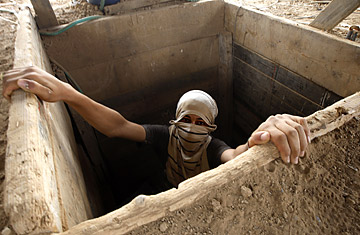
A Palestinian smuggler exits a tunnel that runs between Egypt and Rafah in the southern Gaza Strip on June 3, 2010
(2 of 2)
Israeli officials say the blockade must remain in place to stop Hamas from being supplied with rockets and other heavy weaponry by their allies in Hizballah and Iran. They reject the charge that they have plunged Gaza into poverty and food dependency, pointing to the first three months of 2010 that saw 3,828 trucks carry more than 95,500 tons of goods into the Gaza Strip, including food, medical supplies, wheat, rice, clothes, footwear, milk powder and baby food. Just days before the flotilla fiasco, the press office of Netanyahu sarcastically recommended the fine-dining restaurant Roots to foreign reporters sent over to chronicle humanitarian conditions. And indeed, in Gaza City, white-coated waiters do serve expensive meals at Roots. The beef Stroganoff has been unofficially dubbed "Bibi Stroganoff."
But much of the commerce that has managed to survive the blockade operates with rather shadowy mechanisms. At the small grocery run by Hani Abu Fadi in a refugee camp south of Gaza City, the shelves are stocked full of goods, from basic foodstuffs to chocolates. Many of the tins are Egyptian, but Hebrew packaging indicates that some items have been imported from Israel, including fresh milk and washing powder. Abu Fadi says prices have fallen by about one-third on some items in the past year. "There is no shortage of food; there are even stockpiles," he says. "I assume the wholesalers who used to work with the Israeli border crossings are now bringing their supplies through the [smugglers'] tunnels, but I don't ask."
Down in the town of Rafah on the border with Egypt, a makeshift hut constructed from blue nylon sheeting nailed onto a frame covers the mouth of a smuggling tunnel underneath the frontier. A man who identifies himself only as Abu Ahmed dug his tunnel two years ago on the site of a destroyed house that he bought from the previous owner. It is 25 yards deep and half a mile in length. It took six months to build and is connected by cross-passages to five or six neighboring tunnels in case of emergency. He descends by rope down a 4-ft. square vertical shaft lined with wood to a passage that emerges in a gentle slope inside a building on the other side of the border. There is an emergency generator for electricity and a compressor to pump air through. "I bring in everything, but nothing that is illegal," he says. "From food and motorcycles to animals. I once brought in two lions for the zoo — small ones."
Abu Ahmed says that in a good month, he can make $300,000. His only tax was a one-off payment of about $2,500 to Rafah Municipality for electricity. A qualified doctor at a nearby hospital earns just $900 a month. Gazans are concerned that the new elite of tunnel smugglers have a vested interest in continuing the siege.
A poll conducted in March indicated that Palestinians were becoming fed up with Hamas: 37% of Gazans told the Palestinian Center for Public Opinion that they trusted the Fatah party of Palestinian Authority President Mahmoud Abbas to govern, while only 22% said they preferred Hamas. But with the actions against the aid flotilla last week, Israel may have inadvertently thrown the Hamas government a lifeline. "What happened this last week was a surprise for everybody," says Omar Shaban, president of PalThink, a Gaza-based strategic studies think tank.
Shaban says Israel's seizure of the flotilla brought the situation in Gaza to world attention and may trigger enough pressure on Israel to end its blockade. "The Gaza issue is totally different after the ships than before the ships. It's like a political tsunami, whether you support Hamas or not," he says.
